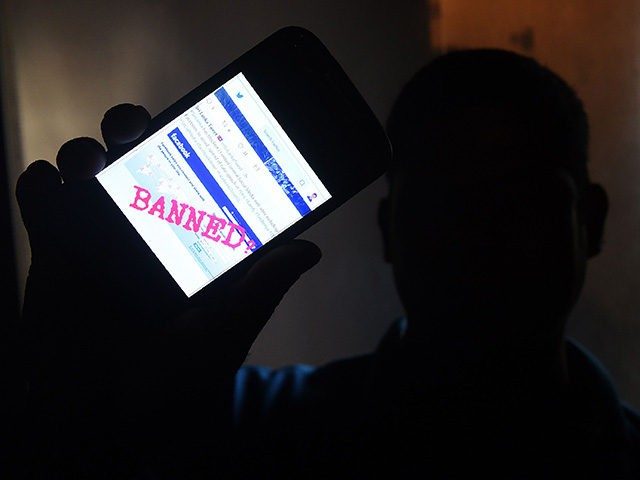Facebook, Google, and Twitter filed a legal brief on Monday, contending that Internet service providers (ISPs) such as Comcast or Verizon should not be able to censor content, while they reserve the right to censor content themselves.
The Internet Association (IA), a trade association representing Facebook, Google, and Twitter, filed a legal brief with 22 state attorneys general to challenge the Federal Communications Commission’s (FCC) repeal of the agency’s 2015 net neutrality rule.
The Internet Association believes that the country needs net neutrality because the broadband market is not competitive enough to allow consumers to switch between ISPs if they disagree with their policies.
While the IA argues that ISPs have a monopolistic control over the broadband market, a Wall Street Journal article pointed out that Google drives 89 percent of Internet search, Google and Facebook absorbed 63 percent of online ad spending last year, and Google and Apple provide 99 percent of mobile phone operating systems, while Apple and Microsoft supply 95 percent of desktop operating systems.
IA President and CEO Michael Beckerman said in a statement on Monday, “Strong net neutrality protections ensure that consumers, not ISPs decide what websites and apps you can use. Chairman Pai’s 2017 rules took these protections away from consumers, and IA will continue our fight to restore them in every available venue.”
“The internet must remain open and free from unreasonable traffic discrimination,” said Stan Pierre-Louis, an executive at the Entertainment Software Association (ESA).
FCC Chairman Ajit Pai repealed the Obama-era net neutrality regulation last December, believing that the rule stifled Internet freedom.
The FCC’s Restoring Internet Freedom Order, which repealed net neutrality, contended that under net neutrality, content providers such as Facebook, Google, and Twitter have stifled free speech on the Internet, censored conservative and alternative voices, and serve as a greater threat to free speech compared to ISPs.
In the Internet Association’s brief on Monday, they suggested that ISPs can “position themselves as ‘gatekeepers’ between edge providers and their customers,” which can limit “consumer choice.”
“ISPs can abuse their gatekeeper position by restricting consumer access to online content, which in turn harms edge providers,” IA added.
Twitter, a member of the Internet Association, has become embroiled in controversy over its “shadowbanning” practice, which limits the reach of a Twitter account’s reach. Facing increasing pressure from lawmakers, Twitter chief executive Jack Dorsey agreed to testify before the House Energy and Commerce Committee on September 5 regarding his content moderation and censorship practices.
However, many tech experts, including Pai, have charged that Facebook, Google, and Twitter, also known as edge providers, have become the true gatekeepers of the Internet, which allows them to censor on a significant scale. Facebook, Google, and Twitter are edge providers, or companies that host online content and use a customer’s ISP to deliver content to that particular user. The Federal Trade Commission (FTC) regulates and polices edge providers, whereas the FCC regulates ISPs.
Pai elaborated during a speech in November 2017:
In this way, edge providers are a much bigger actual threat to an open Internet than broadband providers, especially when it comes to discrimination on the basis of viewpoint. That might explain why the CEO of a company called Cloudflare recently questioned whether “is it the right place for tech companies to be regulating the Internet.” He didn’t offer a solution, but remarked that “what I know is not the right answer is that a cabal of ten tech executives with names like Matthew, Mark, Jack, . . . Jeff are the ones choosing what content goes online and what content doesn’t go online.
Former Federal Communications Commission (FCC) Wireless Bureau Chief Fred Campbell has argued that Congress should repeal Section 230 of the Communications Decency Act, which Campbell contended in an interview with Breitbart News allows social media giants such as Twitter, Google, and Facebook to censor without legal recourse.
“They’re subject to a legislative exception that is a couple decades old, overturning a century of law. If they want to play editor, great, then comply with the laws that all of the others editors comply with and give up your special exemption,” Campbell charged.
Campbell also said, “We the people should decide whether Google and Facebook can censor and block content.”
President Donald Trump took to Twitter last week and called out giant social media companies such as Google, Facebook, and Twitter for censoring “millions” of Internet users.
“Social Media Giants are silencing millions of people,” Trump cautioned.
The president added, “Can’t do this even if it means we must continue to hear Fake News like CNN, whose ratings have suffered gravely. People have to figure out what is real, and what is not, without censorship!”
Social Media Giants are silencing millions of people. Can’t do this even if it means we must continue to hear Fake News like CNN, whose ratings have suffered gravely. People have to figure out what is real, and what is not, without censorship!
— Donald J. Trump (@realDonaldTrump) August 24, 2018

COMMENTS
Please let us know if you're having issues with commenting.